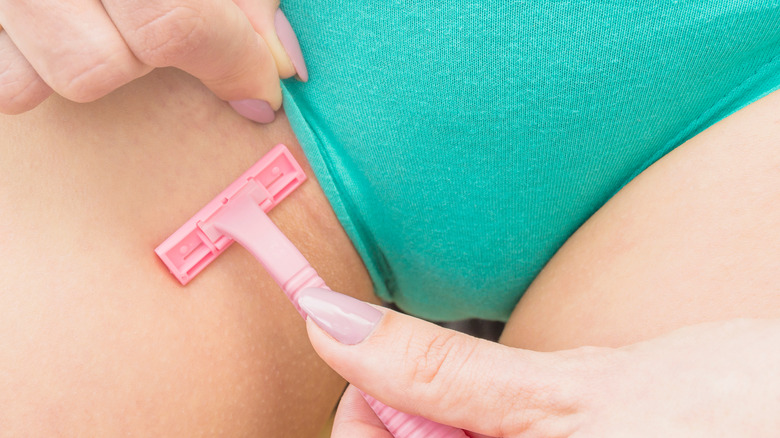How Can You Tell If You Have Herpes Or An Ingrown Hair?
Lumps and bumps on the skin are never a fun experience, whether it's a harmless skin tag, the teenage curse of acne, or more serious skin infections like boils and abscesses that occur when bacteria enter a cut or scrape. But there are particular areas of the body where you really don't want to see a bump crop up, and the genital area is right up there on the list. When a mysterious painful lump appears down there, it's easy for panic mode to set in. Is this no big deal, or do you need to book a gyno appointment ASAP?
Two of the most common causes of genital sores are ingrown hairs and genital herpes. One is an annoying but harmless condition; the other is an infection that requires medical intervention. How do you know which one you have? It depends on the symptoms and what occurred prior to them.
Improper shaving can cause ingrown hairs
As the name suggests, ingrown hairs are hairs that curl back under the skin surface instead of breaking through. It happens frequently in areas where the skin is shaved, including the face, legs, and, yes, the pubic region (via Mayo Clinic ). The curly nature of pubic hairs makes them more prone to re-entering the skin after shaving. Typically, an ingrown hair causes a bump that may or may not be pus-filled. It may itch or be painful, and the area around the lump may darken. You may also see the actual hair under the skin. Unlike herpes, ingrown hairs aren't infectious and don't recur on their own.
Ingrown hairs can be treated at home by washing the area gently every day with a washcloth until the hair is released. If the area becomes infected, a doctor may prescribe an antibiotic cream. The best way to avoid ingrown hairs in the groin area is to use non-shaving hair removal techniques such as creams or electrolysis. If you prefer shaving, be sure to wet the area beforehand and use a lubricating shave cream. Avoid pulling the skin area taut when you shave, which is more likely to cause the remaining hair to retract into the skin. Follow up your shave with a moisturizing lotion.
Genital herpes is a chronic condition
Unlike ingrown hairs, herpes is caused by a virus that is easily transmissible through intimate contact such as kissing or sexual intercourse. Cold sores on the mouth are a form of herpes. In the genital area, herpes presents itself as small fluid-filled sores that erupt several weeks after the initial infection (via WebMD ). The area may itch or tingle before the sores actually emerge. The initial infection may also be accompanied by flu-like symptoms like headache or fever.
Herpes should be diagnosed and treated by a doctor, who can take a sample from the sores to make a definite diagnosis. The condition is treated with an antiviral medication; Some patients take it only during flare-ups, while others may need to take it every day if their outbreaks recur often.
The herpes virus remains in the body even after symptoms go away, so once you contract herpes, you have it for life. Outbreaks may be more likely to happen if you're stressed, spend long periods in the sun, or during your period. But even if your symptoms aren't active, you can still transmit the virus to others, so it's important to wear protection each and every time you have sex, and if you have an outbreak, it's best to avoid sex altogether until the sores go away.


